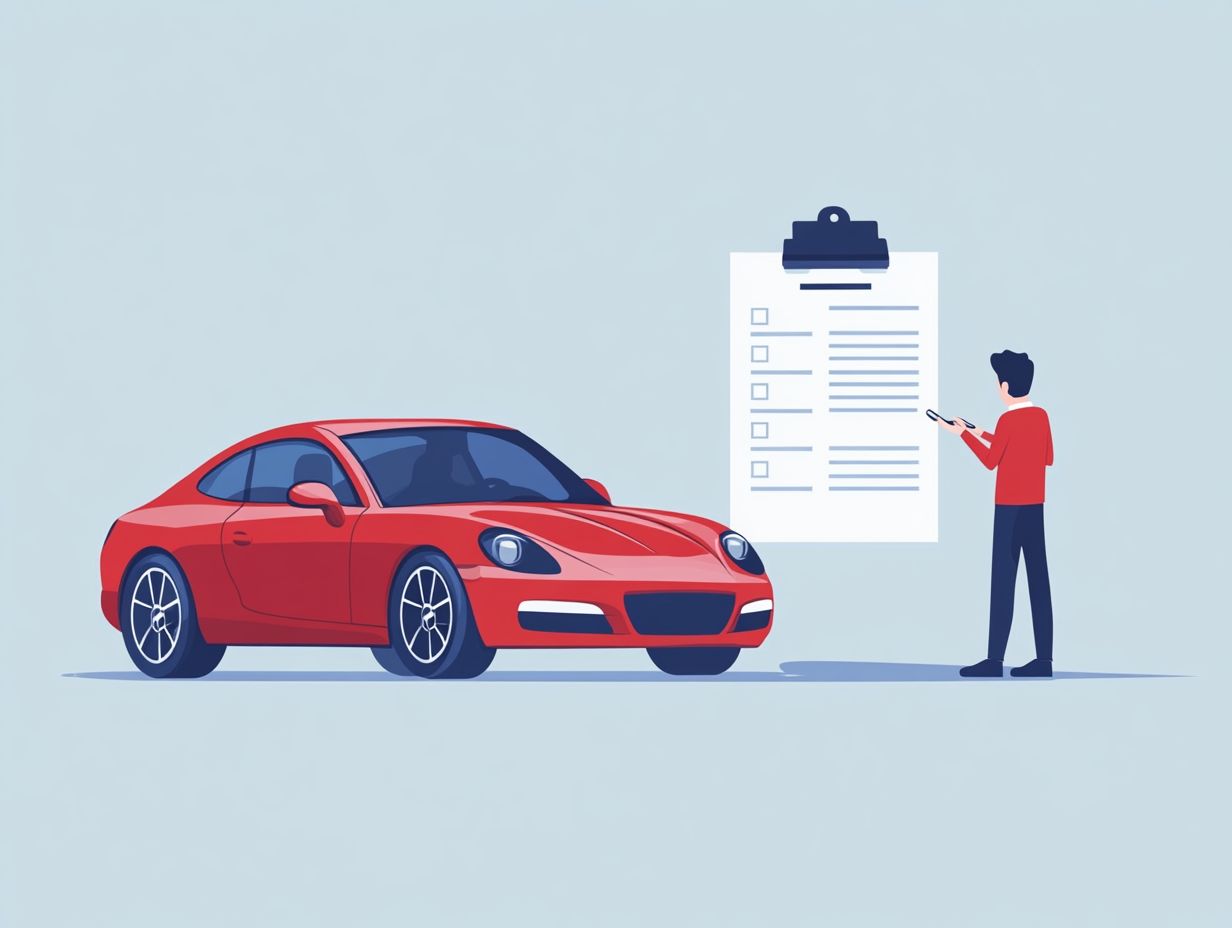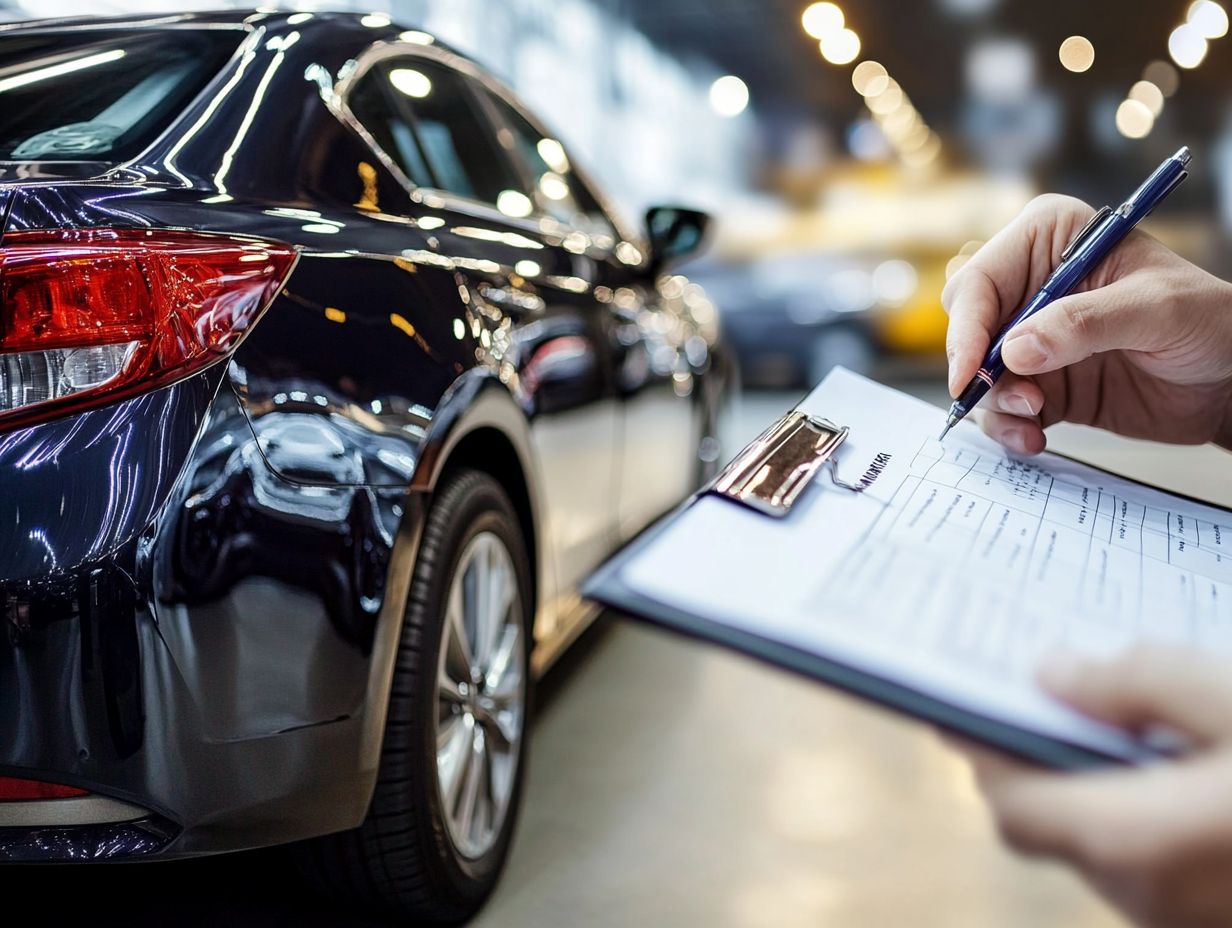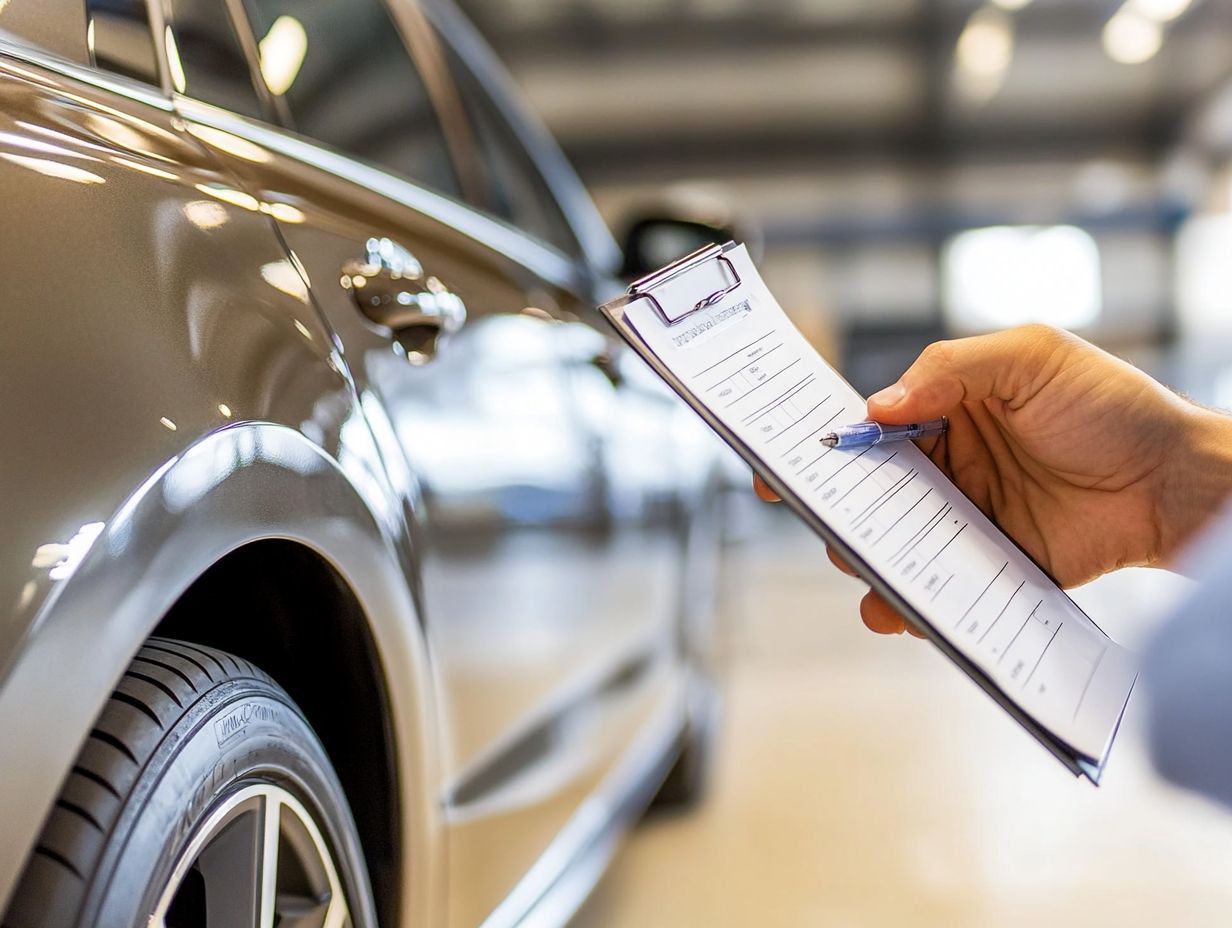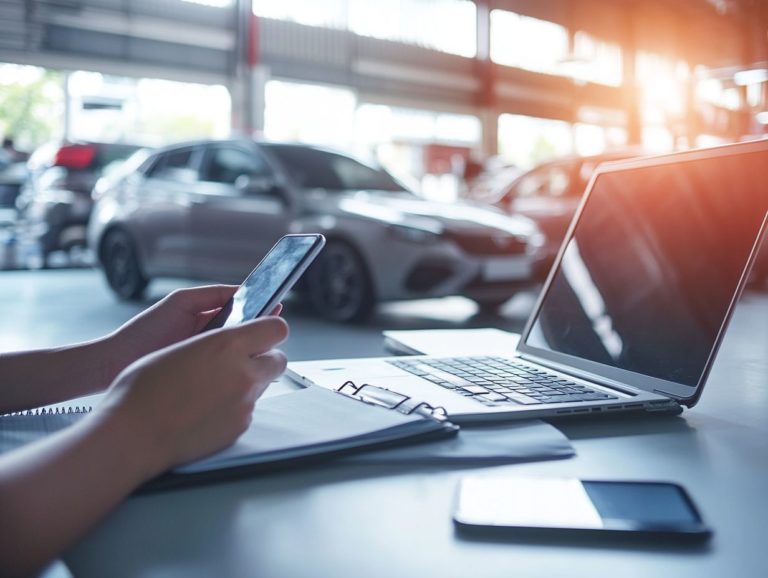The Pros and Cons of Buying a New Car
Are you thinking about buying a new car? It s an exciting but intimidating decision, with many benefits and a few drawbacks.
You’ll be drawn in by cutting-edge technology and great warranties. However, consider the higher costs and depreciation that come along with your choice.
This article explores the pros and cons of buying a new vehicle. It highlights key factors to think about and looks at alternatives like used cars and leasing.
Continue reading to confidently navigate your car-buying journey!
Contents
Key Takeaways:

- A new car usually comes with a warranty for extra peace of mind.
- You can customize your new car with the latest technology.
- Be mindful of the higher costs and quicker depreciation when buying a new car.
What to Consider Before Making a Purchase
Before you buy, consider the factors that will shape your investment decision. Reflect on your financial goals, set a budget, and consult a financial advisor if needed.
Understanding auto loans is crucial to avoid financial strain. Check potential monthly payments to ensure they fit your budget, and learn about insurance costs for the vehicle you want.
Watch out for hidden flaws in both new and used cars. Thorough research and vehicle inspections are essential to avoid costly repairs later.
Advantages of Buying a New Car
Buying a new car is an exciting experience packed with benefits. You’ll get reliability and the latest features right off the bat, so it’s helpful to know what to expect when buying a new car!
New cars often come with a car warranty that covers essential repairs during ownership. The latest technology and safety features enhance your driving experience and boost your confidence on the road.
Warranty and Reliability
A major benefit of a new vehicle is the car warranty, which ensures your repairs won t lead to unexpected costs. This peace of mind means you can drive worry-free.
You may also find dealership warranties offering extended coverage beyond the standard terms. These can be tailored to your needs for added protection.
This coverage helps maintain your car’s value and guards against quick depreciation. Well-maintained vehicles can also lower your insurance premiums, saving you money in the long run!
Customization and Technology
The chance to customize your new car is a significant advantage. This allows you to select the latest technology and safety features that perfectly align with your preferences. You might consider options like hybrid systems for better fuel efficiency, modern infotainment systems, and various safety features designed to enhance your overall driving experience.
These choices not only cater to your tastes but also contribute to long-term savings and convenience. Innovations such as adaptive cruise control, a feature that helps maintain a steady speed without needing to press the gas pedal, and lane-keeping assist elevate safety while minimizing wear and tear on your vehicle. This leads to better maintenance outcomes.
By prioritizing both satisfaction and security, you can drive with peace of mind, knowing you ve made a wise investment. The inclusion of fuel-efficient technologies encourages environmentally friendly driving habits, transforming your purchase into a proactive step toward a sustainable future.
Disadvantages of Buying a New Car

While purchasing a new car presents many benefits, it’s essential to recognize the accompanying drawbacks, especially regarding cost and depreciation. To make an informed decision, consider exploring the pros and cons of leasing a luxury car.
The substantial initial investment required for a brand-new vehicle can impose financial burdens, resulting in larger monthly payments that may strain your budget.
New cars also lose value quickly, often shedding a considerable portion of their worth within the first few years of ownership.
Higher Cost and Depreciation
The steep initial cost of new cars is a major drawback that can impact your finances right from the start. As soon as that shiny new vehicle rolls off the dealership lot, it begins to lose value, typically shedding a notable percentage within its first year. This rapid depreciation can seriously affect your overall investment return.
Understanding how this depreciation rate interacts with resale value is crucial if you re considering a purchase or lease. If your vehicle loses value faster than you expected, the financial burden can escalate, influencing your decisions down the line.
To keep costs in check, savvy shoppers should explore leasing options and focus on models known for their durability and slower depreciation rates. Keeping a close eye on monthly expenses like insurance and maintenance is also essential for making well-informed choices.
With this knowledge, you can confidently assess whether your vehicle investments align with your financial goals, leading to smarter, more cost-effective decisions.
Limited Options and Availability
Limited options and availability are significant drawbacks you may encounter when purchasing a new car. Specific models or configurations might not always be in stock or within your budget, affecting your search for the perfect vehicle.
In today s competitive market, you re not just dealing with limited inventories; you also have to navigate soaring demand, which can lead to delays and inflated prices. High-demand situations often result in lengthy waiting periods for the vehicles you desire.
Consider alternative options like certified pre-owned vehicles. These can be an affordable and accessible choice that doesn t compromise quality. Leasing a vehicle is another viable route, allowing you lower monthly payments while enjoying the chance to drive a newer model, all without the long-term commitment of ownership.
Both strategies offer flexibility and can help you align your automotive choices with your budget constraints.
Factors to Consider when Deciding to Buy a New Car
When contemplating the decision to buy a new car, it’s essential to consider several factors that will help you make a well-informed purchase tailored to your needs.
Start by evaluating your financial situation; establish a budget that reflects your requirements and understand the long-term costs associated with vehicle ownership. These considerations will illuminate potential financial liabilities and underscore the importance of making smart financial choices.
By reflecting on these aspects, you can ensure that your decision aligns perfectly with your lifestyle and goals.
Personal Needs and Budget
Evaluating your needs and setting a budget based on your financial goals is essential when shopping for a new car. Understanding your investment decision means analyzing your current financial situation. This includes potential monthly payments to ensure your purchase aligns with your lifestyle and future aspirations.
It s vital to consider not just the initial cost but also the long-term expenses tied to ownership, such as insurance, maintenance, and fuel. Different financing options can significantly influence those monthly payments and your overall budget.
For example, opting for a monthly car loan might provide lower interest rates compared to a personal loan, but it’s crucial to weigh the terms and repayment period.
By comparing various financing alternatives, you can pinpoint the most manageable approach for your unique circumstances, ultimately leading to a more informed decision that bolsters your financial health.
Long-Term Cost and Value

Long-term cost and value are crucial factors that can significantly shape your financial landscape when purchasing a car. It s not merely the upfront price that deserves your attention; ongoing vehicle maintenance, depreciation, and additional expenses like insurance premiums all play vital roles in determining your return on investment.
Understanding the details of maintenance schedules and fuel efficiency can save you considerable amounts over time. For example, choosing a vehicle with lower fuel consumption not only cuts costs at the pump but also enhances your driving experience, allowing for fewer fuel stops and more time enjoying the road.
Too often, the importance of regular maintenance is overlooked. Yet, it can prevent those dreaded costly repairs down the line. By grasping these long-term costs, you equip yourself to make informed decisions that align with your financial goals and lifestyle preferences, ensuring your investment continues to pay off.
Alternatives to Buying a New Car
If you’re feeling uncertain about the financial commitment of buying a new car, rest assured there are several alternatives that can offer both flexibility and savings.
Consider options like purchasing a used car or leasing a vehicle; these avenues allow you to enjoy the benefits of vehicle ownership without the weight of high initial costs.
Certified pre-owned vehicles offer reliability and affordability, making them an attractive choice for those looking to strike the perfect balance.
Used Cars and Leasing Options
Exploring options like used cars and leasing a vehicle can lead to substantial savings, perfectly aligning with your financial goals and budget tailored to your unique circumstances. Used cars generally come with lower upfront costs and depreciate at a slower rate, while leasing offers the allure of newer models with more affordable monthly payments.
Make sure to check the reliability of used vehicles to avoid surprises! Older models might harbor hidden issues that could result in expensive repairs later on. On the flip side, leasing often means driving a vehicle that s still under warranty, significantly reducing the likelihood of unexpected repair bills.
When evaluating the overall costs of vehicle ownership, consider the long-term investment that comes with buying new cars. This can lead to equity and less financial uncertainty in the future. By grasping these dynamics, you enable yourself to make informed decisions that align seamlessly with your financial planning objectives.
Frequently Asked Questions
What are the pros of buying a new car?
One of the main benefits of buying a new car is that it comes with a manufacturer’s warranty, providing peace of mind and potential savings on repairs.
What are the cons of buying a new car?

The biggest downside of buying a new car is the depreciation. As soon as you drive off the lot, the value of the car decreases significantly.
Is financing a new car a good option?
Financing a new car can be a smart choice if you have a good credit score. You may secure a low interest rate, but remember, you’ll pay interest on top of the car’s price.
What are the benefits of leasing a new car?
Leasing a new car usually means lower monthly payments than financing. Plus, you can enjoy a new car every few years without the hassle of selling your old one.
What are the downsides of leasing a new car?
When you lease a new car, you don t own it and won t build equity. There are also limits on mileage and wear and tear.
Is buying a new car a good investment?
Buying a new car isn t usually a great financial investment because its value drops over time. However, if you keep the car long-term, it can offer reliability and peace of mind.






